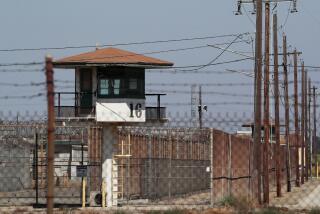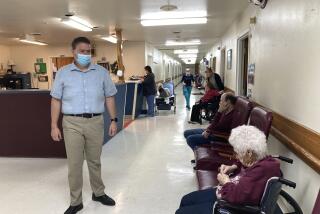A champion of COVID-19 vaccines, Newsom fights plan to mandate them for prison guards

Seeking a vaccine mandate for all state prison guards and staff, a federal court-appointed receiver overseeing the medical care of California’s prisons argued Friday that there have been 11 coronavirus-related deaths since August among corrections employees who were not fully vaccinated and outbreaks at 21 prisons.
“We do really have a problem of continuing major outbreaks,” J. Clark Kelso, the court-appointed receiver, informed U.S. District Court Judge Jon Tigar during a virtual hearing in Oakland. Explaining that the coronavirus has repeatedly spread from staff to the incarcerated, he noted that recently six other states and the federal prison system have mandated vaccines for all prison employees.
Kelso has asked the judge to impose the mandate because he says voluntary vaccination programs of staff have failed. At the High Desert State Prison in Susanville, for example, only 29% of the employees are fully vaccinated.
But Gregg Adam, an attorney for the California Correctional Peace Officers Assn., argued that the state was not indifferent to the prisoners because it has offered the vaccine to 99% of inmates and that nearly a quarter of those have refused inoculation. Adam warned that the implementation of a vaccine mandate among the guards and staff could lead to a significant number of employees being unavailable for work and place extraordinary pressure on the prisons.
Since the beginning of the COVID-19 pandemic, Gov. Gavin Newsom has championed some of the nation’s toughest coronavirus restrictions and called for vaccine mandates for all health workers.
But Newsom and the California Department of Corrections and Rehabilitation have continued to fight the request to mandate vaccinations for all corrections guards and staff. The CDCR oversees 34 prisons and about 99,000 inmates.
Kelso and his medical staff argue that the virus, which they believe is mostly spread from prison staff, has caused more than 50,000 inmate infections and over 20,000 employees to test positive for COVID-19. That has resulted in the deaths of 240 inmates statewide and 39 staff members.
In a court filing last week, Kelso noted five state prisons reported major COVID-19 outbreaks, forcing widespread quarantines. He argues that six months of voluntary vaccination efforts have failed to put a dent in the number of unvaccinated staff that remains just over half.
Newsom’s office issued a statement on Thursday evening defending his stance, saying the governor has “led California to the lowest transmission rate and highest vaccinations in the nation by following scientific consensus and public health guidelines.”
It points out that California was the first state to mandate vaccination or testing for all its state workers, including correctional employees, and a state order covering health workers being vaccinated covers three medical prisons.
“The California Department of Corrections and Rehabilitation was one of the first state agencies to offer vaccinations to staff, beginning at the end of 2020,” he said. “Additionally, California also led the nation in providing early access to vaccines for incarcerated people. Currently, 76% of the incarcerated population has been fully vaccinated, with 56% of staff vaccinated and another 4% having received at least one dose.”
In a statement to The Times, corrections management said its “leadership have long embraced vaccinations against COVID-19, and we continue to encourage our staff, incarcerated population, volunteers, and visitors to get vaccinated. We are also working with those who remain unvaccinated with educational resources, access to clinicians and experts to answer questions, and ample access to the vaccine.”
In questioning the state’s lead attorney Friday, Judge Tigar repeatedly asked whether he thought the risk of preventable death would be reduced if the state was mandated to be vaccinated. “That is what the record shows,” Tigar declared.
Paul Mello, representing the state, told Tigar that the prison’s efforts against the virus have been successful, saying it is not a matter of those infected before vaccines were available but what is happening now, noting only two prisoners are currently hospitalized and 253 testing positive.
Newsom and the state’s opposition to the mandatory vaccines are supported by the unions representing correctional officers and other staff.
In July, the California Correctional Peace Officers Assn. cut a check for $1.75 million to Newsom’s recall defense fund. The Service Employees International Union, which represents about 12,000 staff in prisons, kicked in a combined $5.5 million to Newsom’s anti-recall campaign from its various locals.
Lawyers for the peace officers union argue if the goal is to protect the inmates, then they must look to the 22% of inmates who refused any doses of the vaccines offered.
Rita Lomio, of the Prison Law Office, told the judge Friday the union was resorting to “scare tactics” to suggest that there would not be enough prison guards if the mandate was implemented. She noted federal prisons in Colorado, Oregon, Massachusetts, Washington, Nevada and New Mexico are already requiring prison employees to be vaccinated.
Don Specter, of the Prison Law Office and one of the lead attorneys representing inmates in a lawsuit against the state for overcrowding, in an interview said, “The guards are mostly the source of infection,” and yet the governor is balking at the suggestion they are required to be vaccinated. “Well, the guards and other unions for those in the prisons carry considerable influence. You just have to look at the donations.”
Specter said it is the first time Kelso, appointed by the court to protect the health of those locked up in California, has “broken with the state in the last year on how to react to the pandemic.” The prison law office has for months called upon Kelso to push for mandatory vaccines, saying it is a matter of life and death.
Kelso asked Tigar to impose the mandate saying the Delta variant of the virus “poses enormous risks.” In August alone, 1,607 CDCR employees tested positive, a 300% surge, he informed the court.
“The risk now is grave,” Kelso wrote in a 27-page report to the court about prison conditions. “We cannot afford to be lulled by the decline in infections in CDCR, which mirrored the fall in rates in the larger community.
In requesting Tigar take action, Kelso’s legal team noted that “only 40% of corrections officers statewide are fully vaccinated. The proportion is alarmingly lower in some institutions.“
For example, at High Desert State Prison, “just 16% of all corrections officers are fully vaccinated,” they wrote in court papers. The prison is in the center of the state’s conservative belt, where there is strong opposition to vaccines.
Kelso reported to the court that half of the outbreaks in the state’s prisons during May, June and July could be traced back to employees.
“While staff members are tested, testing is universally recognized as a far imperfect substitute for vaccination,” the report stated. “Staff may be infected between tests. And even when tested, COVID‐19 is often not detectable by test in its early incubation period.”
Kelso said he and correctional medical leadership agree that “vaccination of staff is the best way to achieve the greatest health benefits for incarcerated persons.”
Newsom’s office said the state’s Public Health Officer has already ordered employees regularly assigned to provide healthcare services to be fully vaccinated by Oct. 14.
Kelso said that the state plan accounts for a small portion of prison workers.
Worse still, the over 15,000 inmates deemed high-risk don’t spend their time in the area covered by the healthcare worker order. As of Sept. 1, he added, 385 fully vaccinated inmates had gotten breakthrough COVID-19, with a quarter of those being high-risk.
Kelso’s report to the court included a declaration from Dr. Joseph Bick, director of healthcare services for the California Correctional Health Care Services, stating “vaccination is imperative.”
With such a transmissible strain as the Delta variant, it is particularly important that staff be vaccinated to limit the introduction of COVID into [prison] institutions because once introduced, it is extraordinarily difficult to prevent the spread of COVID-19, which could lead to large-scale outbreaks,” Bick wrote.
Tigar, in concluding the hearing, said he was grateful to Newsom and his criminal justice team for making sure vaccines were available to those incarcerated. And while he is legally limited to considering the welfare of those incarcerated, “I grieve to hear this morning that 11 more ... staff have passed away from COVID.”
The judge took the case under submission and is expected to rule soon.
More to Read
Sign up for Essential California
The most important California stories and recommendations in your inbox every morning.
You may occasionally receive promotional content from the Los Angeles Times.











